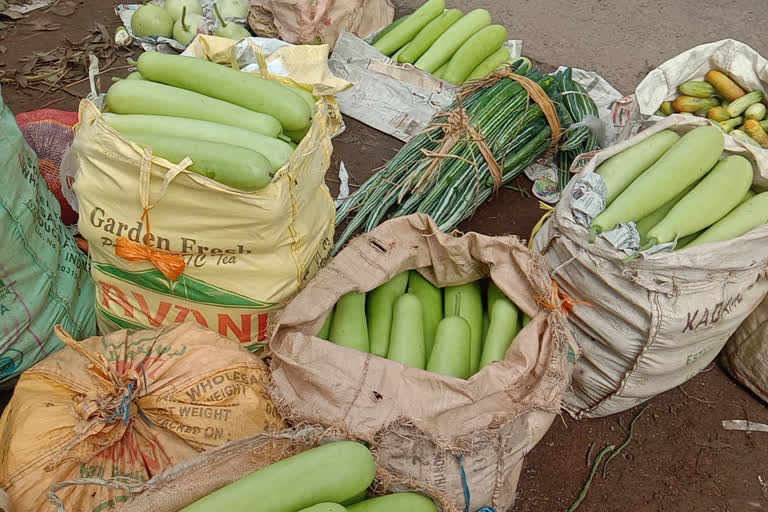Hooghly (West Bengal): Will the farm bill be a game-changer for the farmers in Bengal or will it be a difficult way ahead? The Centre has said that one of the main aims of the bill is to weed out middlemen from the farm sector. There is a diverse opinion of the whole issue. But, what is the opinion of the farmer and the dealers? ETV Bharat tries to find out the ground reality of Bengal.
Most political parties of the state, barring the BJP, are up in arms against the controversial bill, which has been passed by Parliament and is waiting for the President's nod. Hooghly district, one of the farmland rich districts of the state, is also witnessing widespread protests. But, the farmers are literally confused.
To reach farmland produce to the end customer, farmers need a platform to sell their produce. Chief Minister Mamata Banerjee had tried to provide it through her scheme of Kisan Mandis across West Bengal. Many blocks of the agrarian districts have these Mandis. But, the project has eventually become a non-starter as the functional Mandis are ruled by the middlemen. Their agents visit the farmers in the fields and book the produce right there. Farmers have also accepted the practice, as they do not want to waste time engaging in price haggling at the Mandis. Knowing that they are getting marginally less price than what they could have demanded at the Mandis, they are accepting the intermediate solution to prepare their land for the next produce.
Also Read: Bharat Bandh: Farmers hold nationwide protests against farm Bills
On the other hand, a single farmer, who most of the time is a sharecropper, does not have the wherewithal to sell his produce in a different district, leave alone a different state. There comes the agents, the facilitators, agro-businessmen and the warehouse and cold storage owners. More than one lakh people are directly linked to this system in Hooghly district alone. If at all the practice is weeded off, experts also point out that there could be another round of joblessness staring at the state.
The practice of contract farming has failed in West Bengal as most farmers have shifted to traditional systems. Now, they are saying that if the agri-sector is widely privatised, then also any corporate house will need a middleman to deal with the farmers. So, weeding off middlemen from the sector, as claimed by the Prime Minister, could be difficult.
Experts say that fixation of the price of crops is a major issue and so is the procurement process. If the middlemen are done away with, then the cooperative societies could be an alternative. But, the societies also do not have the requisite expertise in the field. Farmers fear that eventually, the corporates could determine the price of farmland produce. Hence, the protests.
Also Read: AIKS, CITU protest against Farm, Labour Bill in Delhi
Samir Koley, a farmer from Polba says, “It is true that farmers will never get their price till agents and middlemen are weeded off. On the other hand, if corporates capture the agri-sector then we have to farm according to their wish and they will determine the price. This is the reason we are protesting against this bill. We want government procurement to continue, be it through Mandis or through cooperatives. This law will actually finish us.”
Tarun Hansda has been working as a middleman in the farm sector for years and he feels that the bill is a waste.
“Mamata Banerjee had tried the Mandi system for direct selling of farm produce by farmers. It has failed largely. The Centre wants people like us to go and replace us with corporates. Then, there should be alternatives for us. What will we do to earn a living? I simply do not understand the fact that how can the Centre even think that a marginal farmer, or for that case, a big farmer, will line up outside the Mandis and mill owners with his produce, seeking a bargaining price? Is it at all possible for produce like paddy potato or jute? Or for that case, vegetables? I don't understand it,” said Hansda.
Manager of Polba Cooperative Society, one of the biggest and prominent in the district, Supriya Barua feels the farm bill is a non-starter.
“The farmer will never benefit from this bill. Actually, the farmers never got rid of agents and middlemen. The only way forward is to strengthen the cooperative movement and its infrastructure. We have seen how come corporates tried to foray into the potato business earlier. They wanted to procure directly from the farmers to produce potato chips. But, when the prices dipped and there was a bumper crop, they simply turned their backs. Whereas, the cooperatives could be an alternative through which the government can carry on the procurement and also ensure a fair price to the farmers,” said Barua.
Time will only tell if the controversial bill becomes a law and then, if any qualitative change comes in the lives and earning of the farmers.
Also Read: 'Disgusting conspiracy' against farmers: Randeep Surjewala on farm bills




